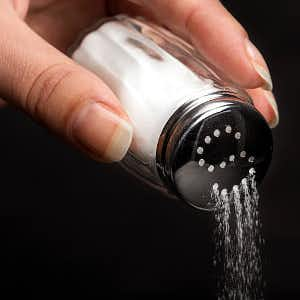
We’ve been told to ban the salt shaker and avoid salty foods. No more chips, pretzels or pickles. But are there tradeoffs when you cut back on sodium? Low-sodium soup often tastes bland. Even when you add other spices, it doesn’t have the same appeal. One reader shared her perspective on low-salt food:
Q. You have written about salt restriction before, so I’d like to add my opinion. I have spent two decades as a caregiver for elderly people and I have seen what a low-salt diet does to them.
Many people lose interest in eating altogether, since salt-free food has very little flavor. My mother deprived herself of salt and still died at 77 of heart disease. I think that people need to weigh this question for themselves.
The Ongoing Low-Salt Food Controversy:
A. Health experts have been debating the pros and cons of a low-salt diet for decades. The controversy has heated up recently because of evidence that both high and low salt intake are linked to higher cardiovascular mortality (Lancet, July 30, 2016).
An eminent expert in hypertension, Dr. Franz Messerli, notes that people with high blood pressure should not overdose on salt. He goes on to point out:
“However, in people with normal blood pressure, lowering salt intake has little if any effect and may even be harmful when becoming too severe.”
This appeared in the American Journal of Medicine, April, 2017.
Our Readers Weigh in On Low-Salt Food:
Torrence offers this perspective:
“Salt. The elder generations never were concerned with salt. My great-grandmother lived to be 100 years old and salt was never a concern with her.
“I do believe that genetics has something to do with our reaction to sodium, but can’t prove it except by what I just stated. I believe we have become so concerned with just about everything we eat we’re not sure what we are eating.
“I have news for all of us. We are going to die some day and I don’t believe salt will cause us to die way ahead of time. I’m 77 going on 78 and don’t really care if I live to be 90 or more. I have seen the plight of those who live to be even over 80 and most of them wind up in nursing homes. NO THANKS!”
Cindy is not too worried about eating low-salt food:
“I adore salt and do eat lots of it. I always add extra salt to my food. When I was a kid I often ate salt out of my hand! I’m happy to report that, at 63, I still have a ~110/70 BP and feel great. Anyway, this article is good news to me.”
Sally in Charlotte, NC, suffered from too little sodium (hyponatremia):
“My husband and I came from New York City and Pennsylvania. We found ourselves in Charlotte, NC. The realtor we used was not looking out for our best interests. We moved from an uptown location to SouthPark (way overpriced and mismanaged). Then we ended up renting, which turned out to be like going from the frying pan into the fire.
“I became so stressed I could hardly get any food down. I lived on water for the most part until I suddenly passed out and had a seizure. (I’m not seizure prone).
I went to the emergency room and was diagnosed with hyponatremia. How many of you have heard of this? It usually occurs in athletes as a result of drinking too much water and not getting down enough salt. It often leads to coma and death. I got lucky. Don’t cut salt out of your diet!”
Everyone is different:
Some people are salt sensitive. If they have high blood pressure and consume excessive amounts of sodium it can be dangerous. But for people with normal blood pressure, using a moderate amount of salt in cooking should not be as risky as the American Heart Association has suggested. There are now a growing number of health experts who believe moderation in sodium consumption (not too much and not too little) makes sense.
What do you think? Please comment below.

